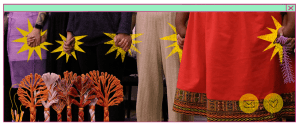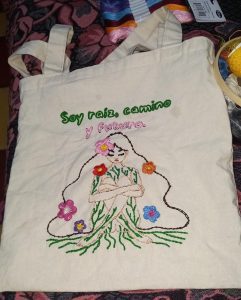
Biciescuela in Costa Rica: The Right to Cycle the City
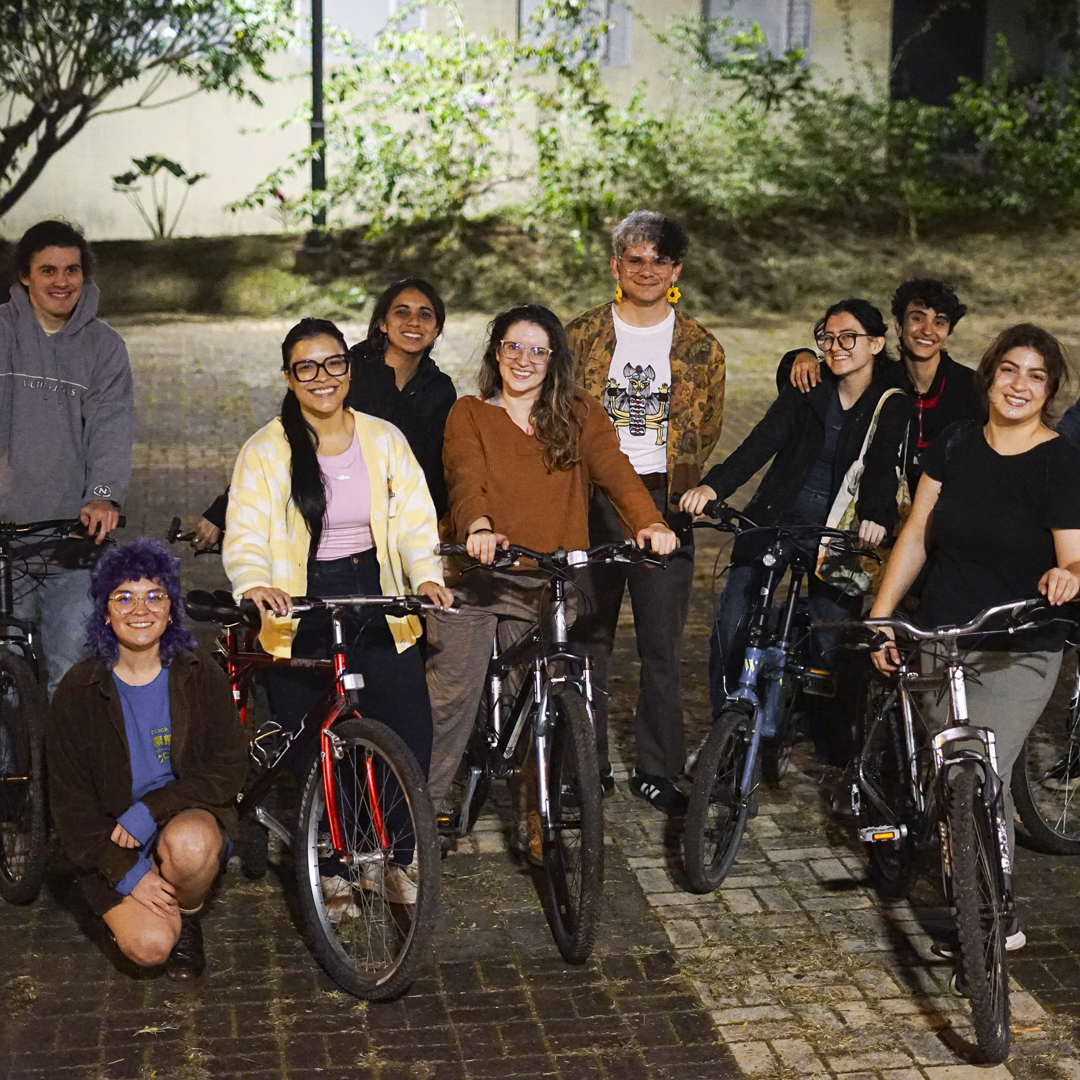
Table of Contents
- Costa Rica: Far from Sustainable Urban Mobility
- Reclaiming the Public Space Through Bicycles
- The Biciescuela as an Alternative for Urban Mobility and Citizen Activism
- Collective Learning in Working with Young Women
- The Change Older Women Experience at the Biciescuela
- Promoting an Inclusive Cycling Culture
- Educational Processes with a Situated Perspective
- If they could dream without limits…
- Call to Action
For decades, we have associated learning with formal, rigid, and often boring spaces. This traditional view reduces learning to the simple act of transmitting and receiving information, neglecting experience, emotion, and a sense of community.
However, innovative initiatives such as Biciescuela in Costa Rica are transforming this narrative by combining a passion for cycling with learning processes and community building. This initiative invites us to reflect on how different forms of oppression affect our lives while also promoting more free, inclusive, meaningful, and enjoyable learning.
To learn more about Biciescuela, we spoke Fiorella Barahona and Natalia Tapia, who run the school. But first, let’s learn a little about the situation of public transportation in Costa Rica and why the right to the city is still an unresolved issue in San José.
Costa Rica: Far from Sustainable Urban Mobility
One of the main ways social inequalities manifest themselves in Costa Rica is the limited and inadequate access to public transportation. The country faces serious lags in urban planning and transportation management, which directly impacts the quality of life of thousands of people.
Many public transportation routes were designed decades ago and have not been adapted to the current needs of the population. The lack of upgrades and modernization means that public transportation is not a viable option for a large part of the population.
As a result, a growing number of people are opting to use private vehicles, exacerbating problems such as traffic congestion, environmental pollution, and the exclusion of those who cannot afford their own means of transportation.
In San José, the urban planning crisis means that the population lacks public spaces for leisure and socializing, making it more difficult to cultivate and strengthen a sense of community. The city is not a welcoming space that people can easily inhabit.
Reclaiming the Public Space Through Bicycles
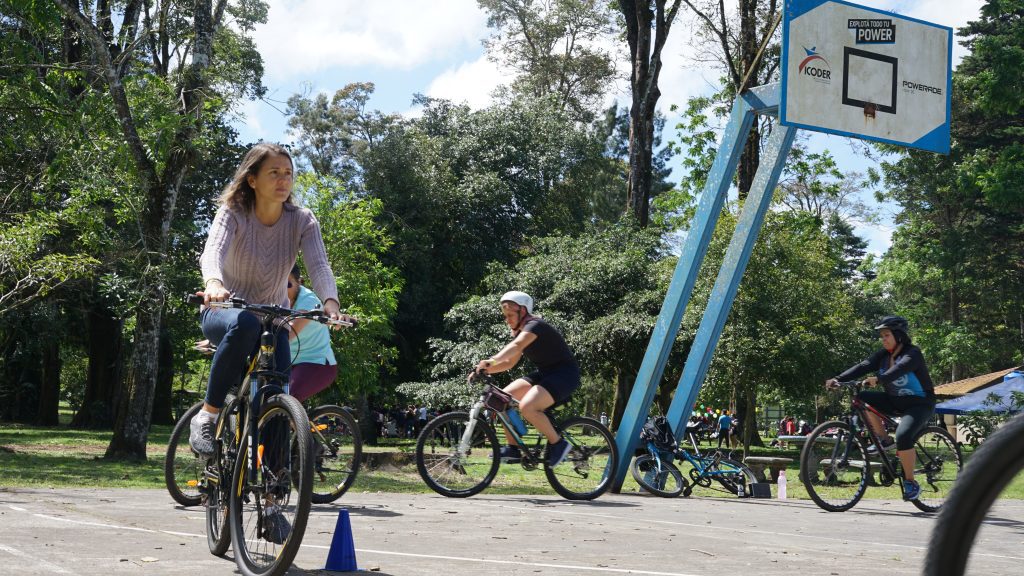
In a context where urban infrastructure is unwelcoming to bicycles as a means of transportation, proposing their use is a daring act. It’s a way of getting around that raises awareness about the need to demand adequate cycling infrastructure that has been designed for people’s actual needs.
Bicycles are the green light to conversations about the right to the city and the use of public space. They invite us to question whether urban planning should continue to center cars or whether we can imagine ways of living and moving around that foster authentic well-being.
In San José, much of the public space is made up of roads. More than 80% of the public area is streets, which limits spaces for meeting and leisure. Thus, while living in a city that is often enjoyed only through consumption, bicycles and using the streets become tools for accessing free or low-cost leisure activities.
The right to leisure activities and public space are linked to the right to the city. If the street is the most available space, people must make it their own through active mobility and collective enjoyment.
The Biciescuela as an Alternative for Urban Mobility and Citizen Activism
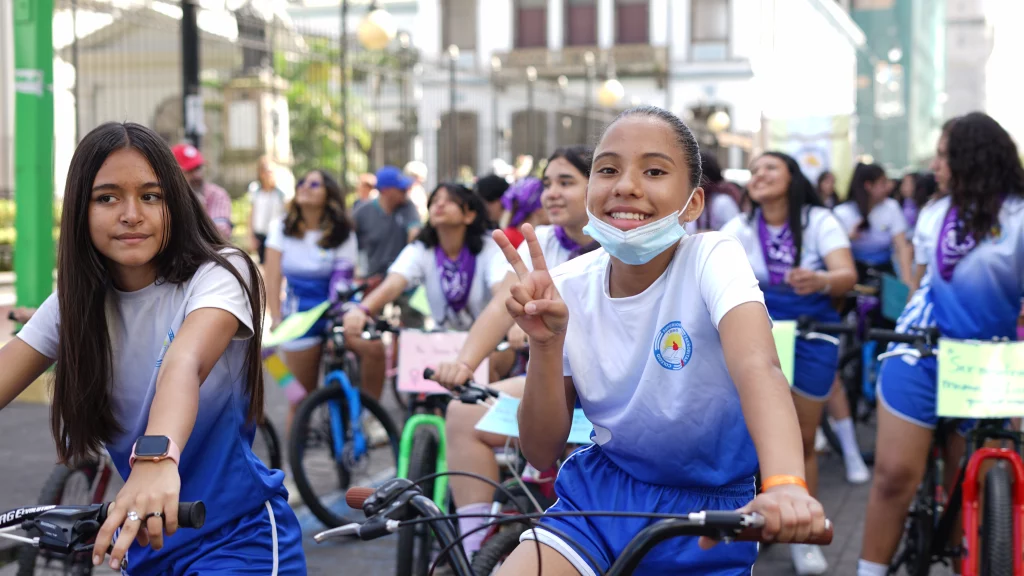
As in many situations in life, a spontaneous conversation can become a seed with the potential to sprout a transformative initiative. That happened to Fiorella Barahona and Natalia Tapia when, in a conversation with a friend from Guadalajara, Mexico, she told them about Femibici, the collective she was member of. At Femibici, the women initially met only to go on rides together, but they later decided gather at a local park to lend bicycles to other women to teach them how to ride.
At the time Fiorella and Natalia, were beginning to use bicycles as a means of transportation, so hearing this story precisely then was a big source of inspiration. They thought about how wonderful it would be to share the joy of cycling with other women and sexual/gender diverse people.
These gatherings are not only about riding together, but also about teaching beginners and taking advantage of these spaces to reflect on their lives and analyze how different oppressions affect them. The bicycle serves as a tool for community strengthening and social transformation.
“That vision of community and of a network was embedded in the project we have today.” Fiorella.
Collective Learning in Working with Young Women
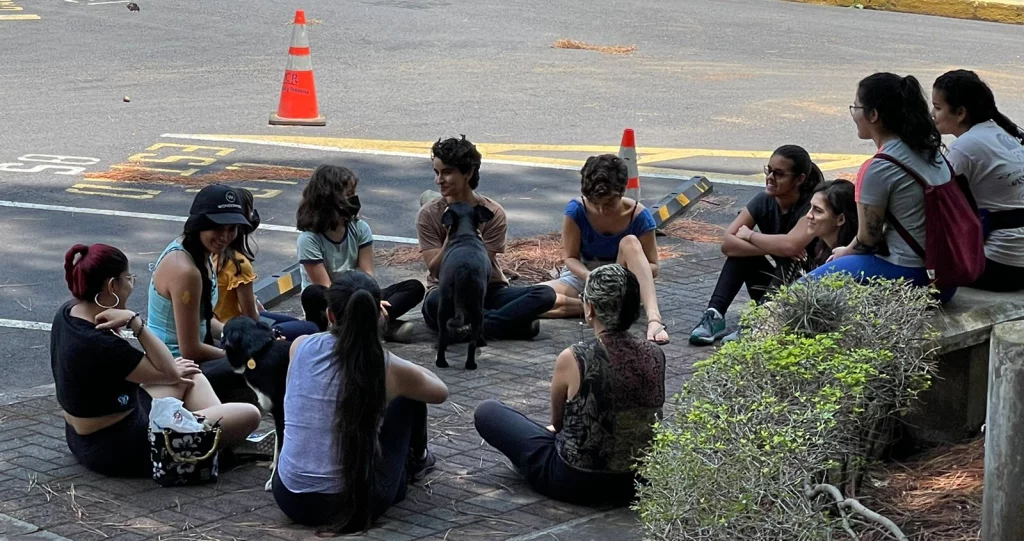
Natalia tells us:
When you grow up in a feminized body and then go to university, you learn about gender perspective, inequalities, and the inequity that exists, specifically in Latin America.
An intuition also develops, fueled by your and others’ experiences. However, when you organize workshops and see the diversity of women, who come from different backgrounds, you begin to notice that, although each one is unique, there are certain patterns, such as a lack of opportunities to learn how to ride a bicycle, or operate any vehicle really.
You begin to notice how we are more afraid of getting hurt or doing certain activities, in contrast to boys. The way we move and face certain forms of violence in public spaces reveals how we are systematically excluded. That’s why we, as a collective, seek strategies to navigate the city defensively, always alert to potential risks.
Sharing these experiences not only opens our eyes and deepens our sensitivity, but also allows us to connect with others and admire each other’s uniqueness.
The Change Older Women Experience at the Biciescuela
Fiorella: When someone starts riding a bike, they experience a state of absolute joy that emerges from deep within them. It’s a beautiful and magical moment, watching the transition of a person who initially thought, “I can’t because I’m 60,” “I can’t because I fell once and could never ride again again,” and then seeing how they overcome their fear.
Natalia: There’s something very beautiful about that moment of realization and surprise. Many of the people who attend our workshops are elderly women, and seeing them describe how they didn’t believe they could pedal, and seeing their eyes, their smiles, and hearing comments like, “The wind is so lovely.” It’s beautiful to see how a person knows that their body can also be a tool for play and movement.
Promoting an Inclusive Cycling Culture
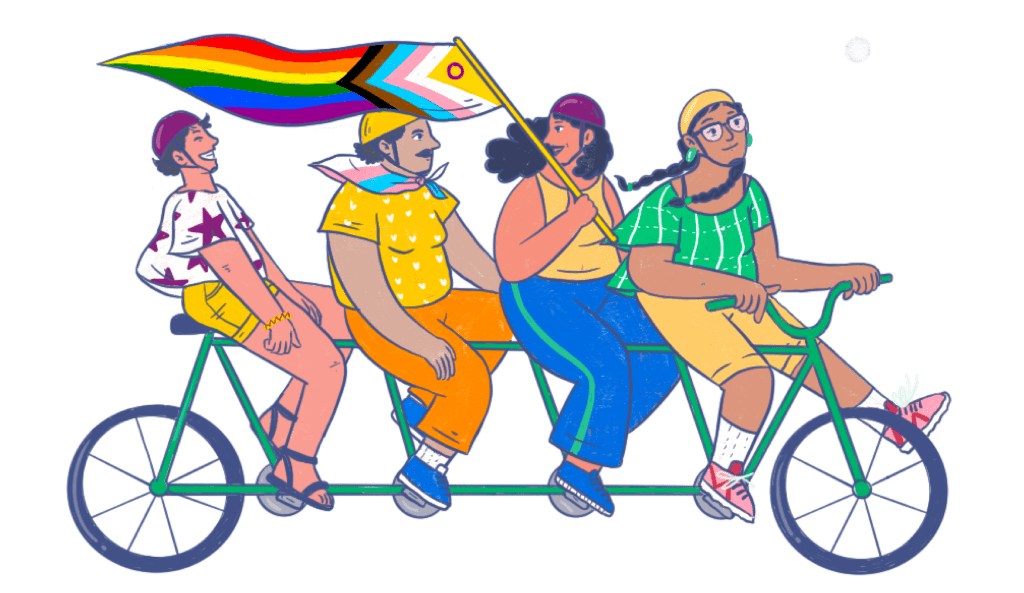
Fiorella: Being lesbian, bisexual, or gender-neutral women ourselves, we resonate with people who might identify with us. That said, it’s also been nice to start welcoming cis men into the space.
It’s interesting because they’re not our target audience, but cycling ultimately brings us together, and it’s kind of an excuse to share ideas, thoughts, and reflections from our place in the world, and to share them transparently because it’s something that touches us.
I think it’s important for communities to have these meeting spaces, but there’s also something enriching about opening up to sharing those perspectives with people and feeling confident about our place in the world.
Natalia: In my case, years ago, the desire to be only in exclusive spaces stemmed from my apprehension to be around people whom I felt wouldn’t be respectful of my identity or my way of life. Today, I feel the opposite. With that confidence, we were able to broaden the perspective of those who wanted to join, being very explicit about our ultimate intention, which is to open the space to women.
Another important factor is the collective work we do with other collectives. It’s not the same to make an open call through social media as it is to make a call through feminist collectives, LGBT collectives, and to reach out to people who have already built their networks with people who gravitate toward them and who trust their work.
We also network with people who have already supported women, LGBTQI+ folk, and other groups for whom navigating the city may not be as friendly as it is for heterosexual cis men.
Educational Processes with a Situated Perspective
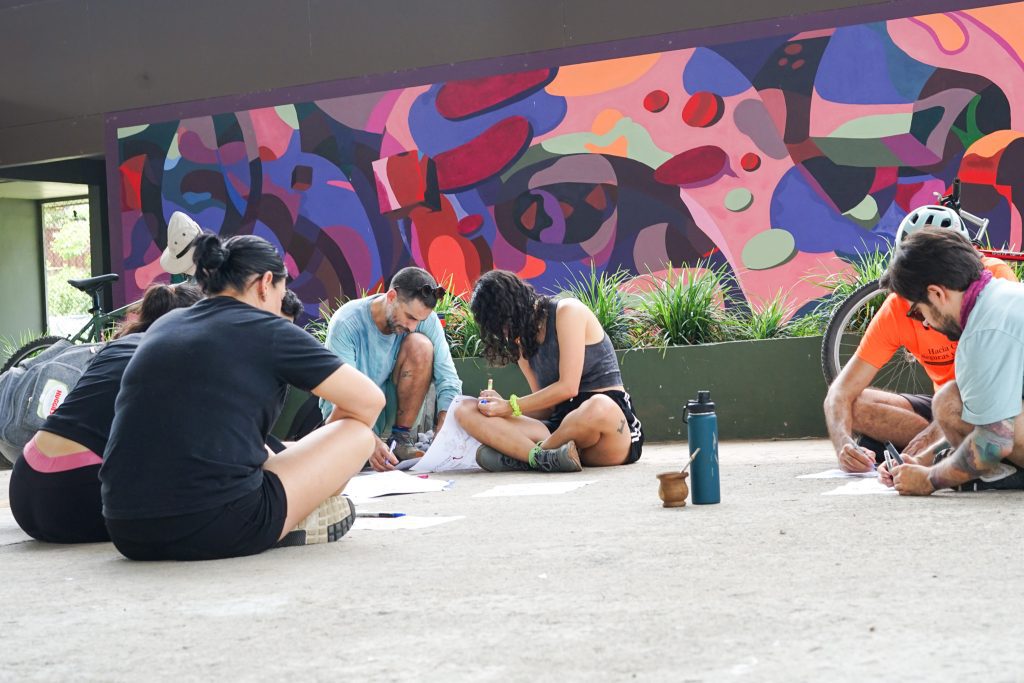
The Biciescuela’s educational processes are based on a situated perspective that is informed by the right to a full life and how people perceive themselves in the world. Recognizing that not everyone has historically had the same opportunities, the project seeks to especially engage those who have been excluded from learning and mobility spaces.
When it comes to the cycling community, the contrast is evident. Boys tend to approach bikes with confidence and enthusiasm, while many girls are apprehensive and distrustful. This difference reveals how learning to ride a bicycle is marked by gender inequalities from an early age.
When the workshops are held, from day one, each participant is invited to share their experience with a bicycle. These stories reveal common patterns: circumstances that have impeded their capacity to learn, to connect with their bodies, to move freely.
Biciescuela’s pedagogical approach is based on respect for individual rhythms, promoting compassion, self-listening, and kindness. An environment is cultivated where there is no pressure to perform, but rather collaboration, patience, and trust in the process. Comparison, competition, and judgment are not welcome.
The project is also linked to collective activism. Participating in bike rides for LGBT+ rights, March 8, and other social causes positions the Biciescuela politically. Many people come, drawn by the act of pedaling, and find in this everyday gesture a gateway to reflection, community, and social transformation.
If they could dream without limits…
“I dream that people lose their fear of the unknown. I dream that the reappropriation the public space does not mean the exclusion of unhoused people or sex workers. I dream that we stop feeling afraid of our differences and are able understand that, in this world, there is room for everyone, and we deserve to live full lives, moving around in cities with clean air.” Fiorella.
I dream “of a place where no design or infrastructure is exclusive, [a place] that doesn’t exclude any body type or any means of transportation in the world.” Natalia.
Call to Action
• Do you live in San José or just passing through?
• Are you interested in connecting with others and exploring sustainable ways to get around the city?
• Do you want to be part of an initiative that promotes cycling education, inclusion, and the re-appropriation of public space?
Connect with the Biciescuela: an urban mobility proposal with a community and feminist focus.
👉 Follow them on Instagram and Facebook to learn about their activities, workshops, and bike rides.

